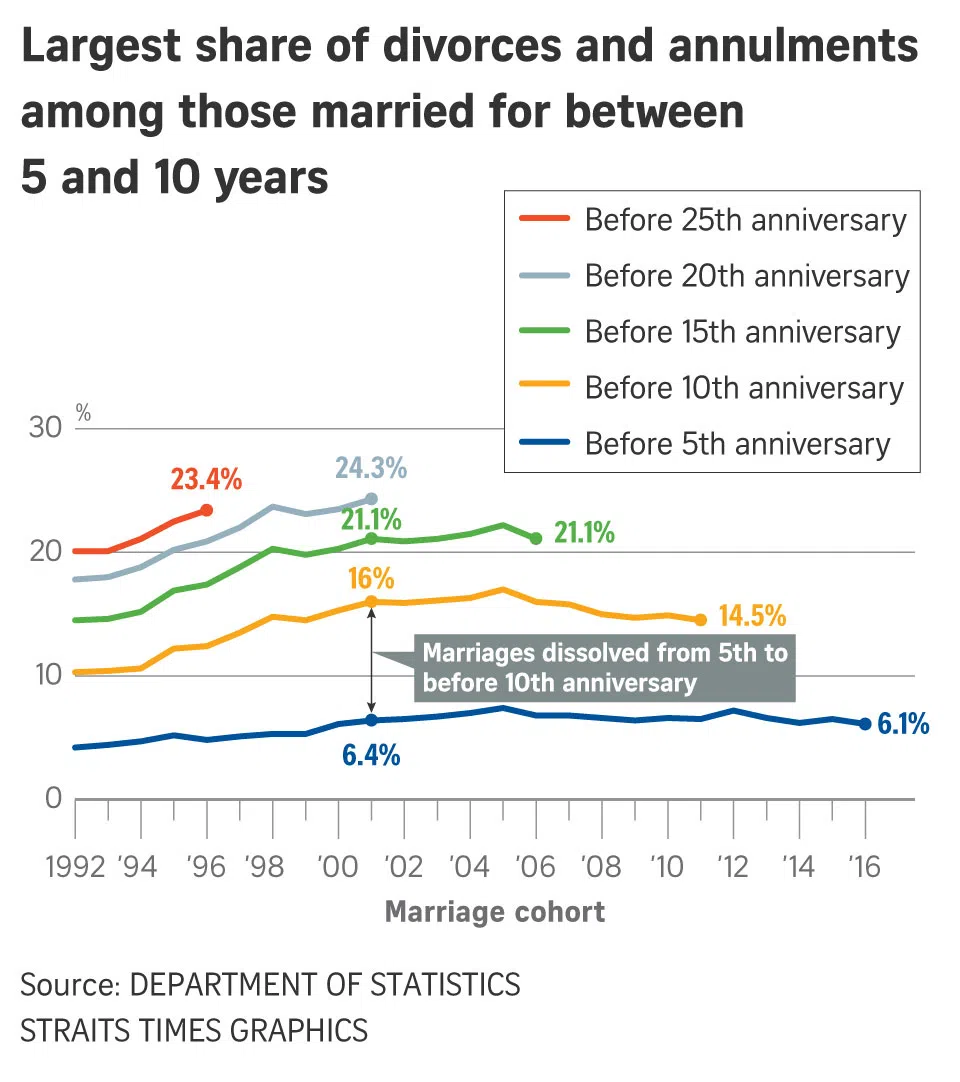Largest share of divorces and annulments in S’pore is among those wed for between 5 and 10 years
Sign up now: Get ST's newsletters delivered to your inbox

Some 6.4 per cent of resident couples who wed in 2001 parted ways before they celebrated their fifth wedding anniversary.
PHOTO ILLUSTRATION: PEXELS
SINGAPORE - The seven-year itch is real, going by divorce statistics which showed that the highest proportion of break-ups came between the fifth and 10th years of marriage.
The seven-year itch is a phrase that refers to the time when people become bored or dissatisfied with their marriage, typically around the seven-year mark.
A total of 9.6 per cent of Singapore resident couples – referring to couples where at least one party is a Singapore citizen or permanent resident – who wed in 2001 ended their marriage between the fifth and before the 10th wedding anniversary.
Those wed for less than five years formed the second-largest group when it comes to marriage dissolution rates. A marriage can be dissolved through divorce or annulment.
Some 6.4 per cent of resident couples who wed in 2001 parted ways before they celebrated their fifth wedding anniversary.
With each subsequent five-yearly milestone from the 10th wedding anniversary, the increase in dissolution rates was smaller, the Ministry of Social and Family Development (MSF) said in a statement on Wednesday.
The MSF issued its statement after the Department of Statistics (DOS) released the Statistics on Marriages and Divorces 2022 on Wednesday morning.
This is the first time the annual statistics on marriages and divorces contain data on the marriage cohort dissolution rate.
A DOS spokesman told The Straits Times it included the marriage cohort dissolution data as it complements the marriage and divorce data, providing a more comprehensive picture on marriages that end in divorce or annulment.
Ms Theresa Pong, counsellor director at the Relationship Room, said there are research findings to support the seven-year itch.
For instance, Dr John Gottman, a psychologist, found that unhappy couples take an average of six years before they decide to seek help.
Said Ms Pong: “Sadly, these six years are generally filled with conflicts, unhappiness and perhaps issues involving trust. By the time couples realise that they need help, it would take a much longer period and effort to heal from the pain they have experienced.
“Unfortunately, many would choose to give up on their marriages, as they feel it would take too much to heal.”

Ms June Yong, who heads the research and editorial team at Focus on the Family Singapore, said couples usually settle into their roles and routines during the first two to three years of marriage.
Some have children during this time. In the next three to five years, they find they have a lot more to juggle – from career to children to finances.
Ms Yong said: “Challenges and conflicts may arise, as life transitions and the pursuit of other life goals introduce more changes to the marriage.
“If the marital foundation – along with the skills of communication, teamwork and conflict resolution – is not strong, couples may drift apart, and the house can begin to crumble.
“Hence, it is important to grow together in marriage and stay connected to each other.”
Singapore Management University sociology professor Paulin Straughan said younger couples generally have a lower tolerance putting up with a marriage that does not live up to their expectations.
She said: “The first five years is generally when we tend to accept that something is fairly new, and it takes some time to get used to one another and for things to fall into place.
“But after five years, if things don’t settle down or meet one’s expectations, there is a greater reluctance among younger people to stay in an unhappy marriage.”
Meanwhile, a smaller percentage of resident couples who wed in more recent years have called time on their marriage, compared with those who wed in earlier years.
For example, the cumulative proportion of marriages that dissolved before the 10th anniversary was 17 cent for those who wed in 2005, compared with 14.5 per cent for those who wed in 2011.
The MSF said the marriage dissolution rates before the 10th anniversary fell more among the cohorts that wed more recently, and this signifies “greater marriage stability among recent cohorts of married couples, as compared with previous cohorts”.
It said that support for marriages, particularly in the early years, is crucial.
For example, there are marriage preparation, marriage mentoring and support programmes to help prepare those planning for a life together or for newly-weds.
There are also marriage enrichment programmes to give couples the tools to sustain a “healthy marriage”, the MSF said.
Couples facing marital issues can also seek family counselling at a Strengthening Families Programme@Family Service Centre (FAM@FSC) or the FAM@FSC Online Counselling platform.
Minister of State for Social and Family Development Sun Xueling said in the statement: “It is encouraging to see a decline in marital dissolutions for the more recent marriage cohorts.
“With the support of our partners, social service agencies and community groups, the MSF will continue to help strengthen marriages through various programmes and initiatives.”


